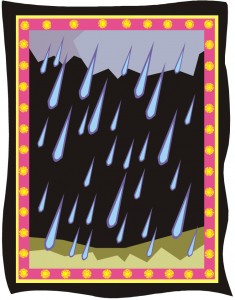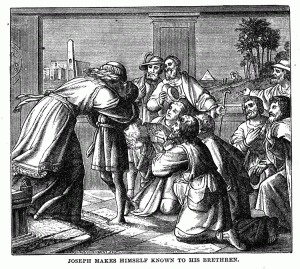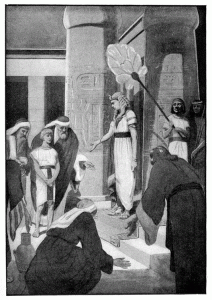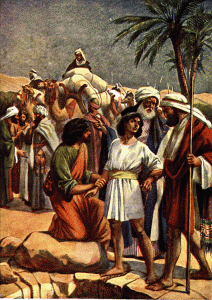Joseph Resembles an Egyptian (Gentile)
Joseph lived in Egypt, became Egyptian, resembled an Egyptian in appearance and even married an Egyptian. When his brothers saw him, they didn’t suspect that he was their Hebrew brother.

Prophetically, Joseph’s physical descendants (the house of Israel and later, Christians) would be carried captive into heathen Gentile nations where they would live as Gentiles in a sort of spiritual Egypt. There they would be all but cut off from the Hebraic roots of their faith and would be indistinguishable from the heathen nations in which they were mixed (Hos 7:8; 8:8; also note Yeshua’s Parable of the Prodigal Son, Luke 15:11–32). Some see the prodigal son in Yeshua’s parable as a picture of the modern Christian who was cut off from the Hebrew roots of his faith (or his father’s house), but who will eventually return to the faith of his fathers as prophesied in Malachi 4:4–6).
Joseph Meets His Brothers (Gen 42)
While in Egypt, Joseph became aware that his brothers (and father) were still alive. He recognized who they were, but they didn’t recognize him, since he resembled an Egyptian (a Gentile).
In the end times, Christians, who many of Joseph’s descendants would become according to Genesis 48:14 and 16, have begun to recognize Judah as their brother. Until this time, most of Christianity had either persecuted the Jews, believed that Christians had spiritually replaced the Jews, or were ambivalent toward the Jewish people. This attitude of many Christians toward Jews, however, began to change in the 1960s with the beginning of the “Jews for Jesus” movement which helped Christians to become aware of the need to evangelize the Jews. The result was that many Christians themselves began to become interested in the Hebrew roots of the Christian faith. Beginning in the 1960s, many Messianic Jewish congregations began forming for Jewish believers in Yeshua, but surprisingly often seventy-five percent of the members of those congregations were actually non-Jewish “Gentile” Christians who were seeking to understand and even practice the Jewish roots of their faith!
From the Jews for Jesus or Messianic Jewish Movement of the 1960s came two unexpected results:
- As Messianic Jewish congregations formed, a large percentage were “gentiles” and not Jewish.
- In the early 1980s, the Messianic Israel or “Two-House” Movement was birthed through Angus and Batya Wootten.
In this latter movement, which is occurring in the 21st century church, Christians are beginning to open their eyes not only to the fact that the Jews are their brothers, but that they themselves are Israelites and are descendants from the ancient tribes of Israel (Gen 48:14, 16; Rom 9:24–27). As this is occurring, very few Jews (as was the case with Judah of old) recognize that these “Gentile” Christians (like Joseph) are their long lost kinsman who are returning after they were long ago dispersed throughout the world as Jacob, Moses (Deut 30:3; 32:26), and the other prophets predicted would happen. Yeshua clearly stated that it was his ministry and that of his followers to regather these lost Israelites (Matt 10:6; 15:24).
Many Christians are now seeing the relevance and fulfilment of many biblical prophecies concerning the regathering of the ancient lost tribes of Israel to the land of Israel (Deut 30:4; Isa 56:8; Ezek 34:13; 36:24), and their reunification with their brother Judah/the Jews (Ezek 37:15–28). They understand this reunification will occur just prior to the return of Yeshua the Messiah (Ezek 37:24–28).
They have also begun to read and understand the mission of Yeshua and his disciples to regather the “lost sheep” of the house of Israel (Matt 15:24; 10:6), and Paul’s clear statements that all those who come to faith in Yeshua are now Israel and are the literal seed or descendants of Abraham (Eph 2:11–19; Gal 3:7, 8, 14, 28, 29).
Furthermore, they have become aware of the fact that it is Israelites who will have a part in the kingdom of Elohim as exemplified by the New Jerusalem, which has only twelve gates that are named after the twelve tribes of Israel. There is no Gentile gate (Rev 21:12)!
Stay tuned for the next installment in this study!








